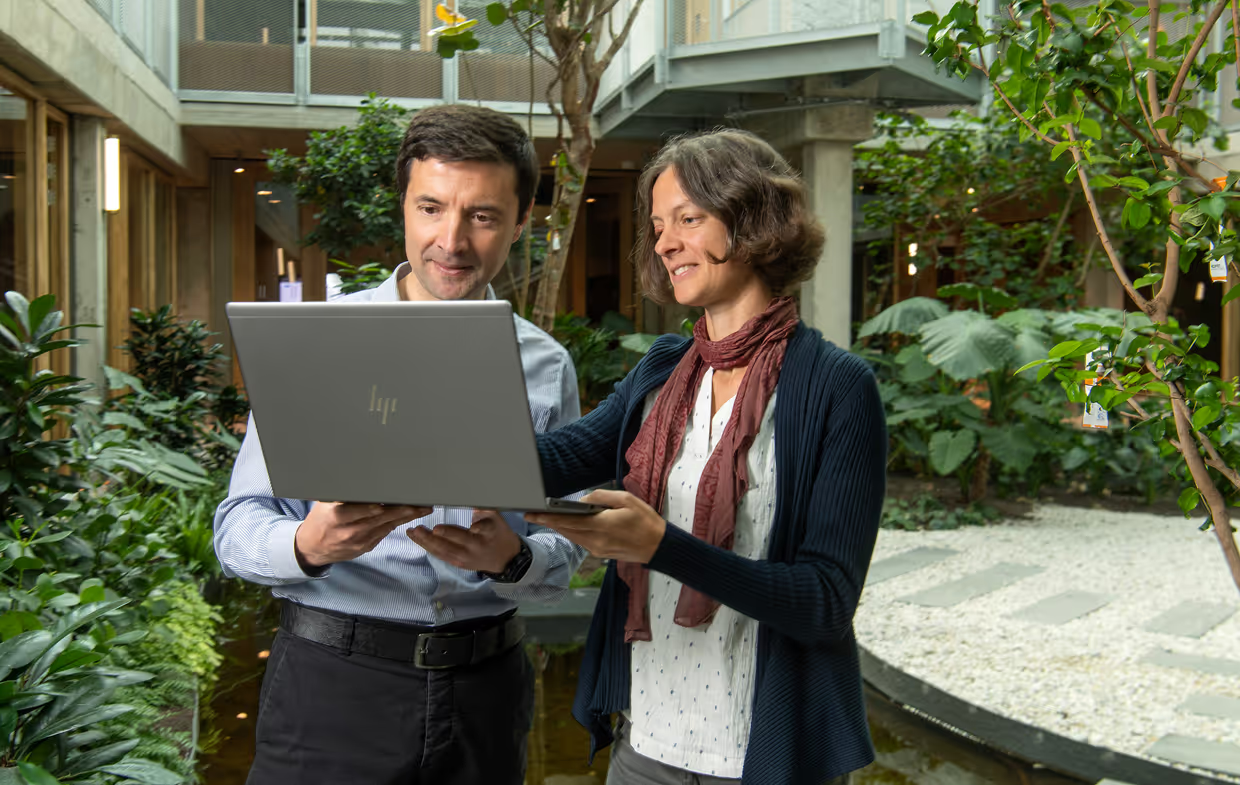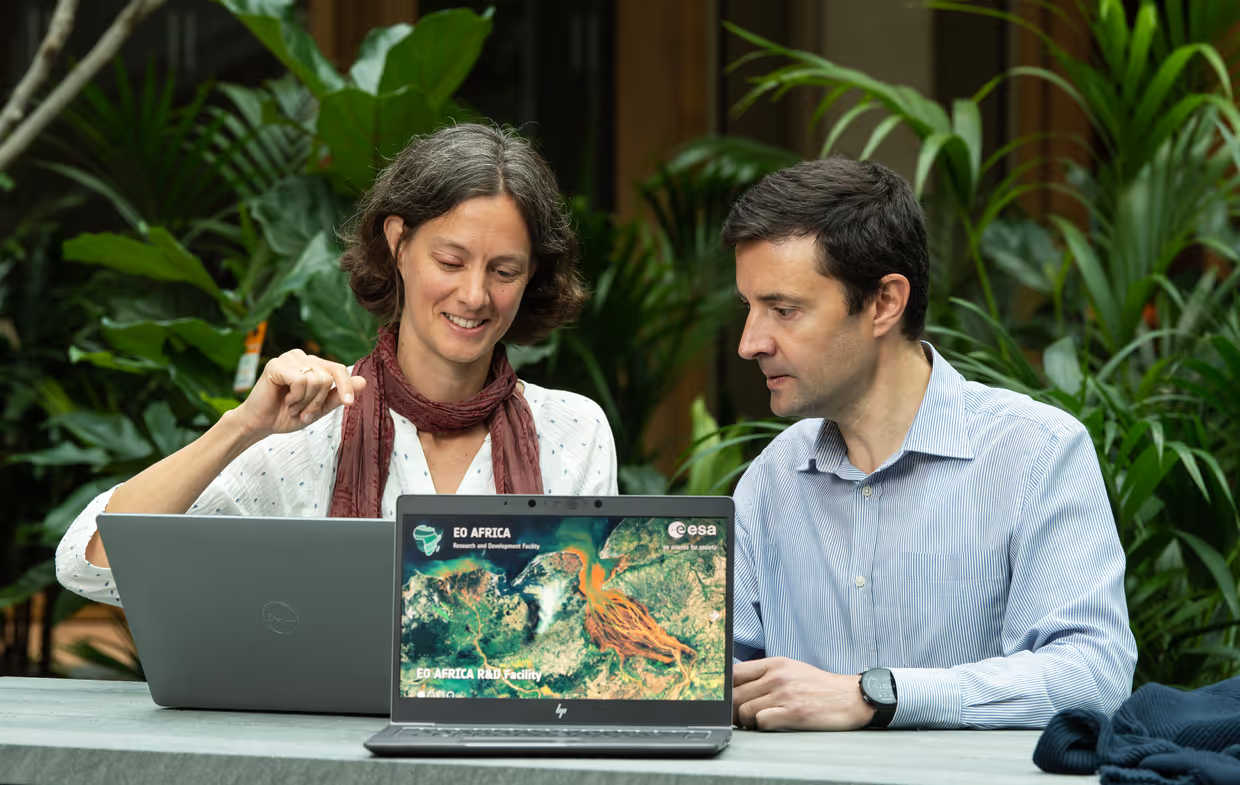The European Commission has proposed an exciting partnership between Africa and Europe to digitally transform Africa. As part of this partnership, the European Space Agency (ESA) has launched the African Framework for Research Innovation, Communities and Application in Earth Observation (EO AFRICA) initiative. This initiative aims to build a long-term, sustainable research partnership between African and European communities. At the heart of this effort is the EO AFRICA R&D Facility, led by the Faculty of Geo-Information Science and Earth Observation (ITC), which seeks to create a thriving research community based on Open Science principles and foster innovation in EO capabilities in Africa.
Together with Serkan Girgin, Head of the Center of Expertise in Big Geodata Science (CRIB) and Associate Professor at the Geo-Information Processing Department of the Faculty of Geo-Information Science and Earth Observation (ITC), and Marloes Penning de Vries, Assistant Professor Water, Climate and Health Interactions at the Water Resources Department, we explore how the facility promotes Open Science practices and how the expertise and services of the Digital Competence Centre are of value in this.
EO AFRICA R&D Facility
Serkan, could you tell us more about you and EO Africa facility? “I joined the ITC-faculty three years ago with the goal of establishing the Center of Expertise in Big Geodata Science, known as CRIB. Our aim is to facilitate the use of cloud computing and big data technologies at ITC. One of the exciting research projects that we are affiliated with is the EO AFRICA R&D Facility led by the Water Resources Department of ITC. This facility is dedicated to addressing African EO research challenges by providing cloud computing infrastructure for researchers, enabling collaboration and creative problem-solving. In addition to this, the facility also provides financial support to 30 research projects and organizes training to improve the use of EO for solving critical issues such as water scarcity and food security in Africa. It's truly valuable work, and I'm happy to say that the project of Marloes is part of that.”
Leveraging the strengths of satellite instruments
Marloes, could you elaborate more on your research project? “Of course! My research revolves around water hyacinth, which is a highly invasive plant species that poses significant challenges worldwide. water hyacinth can clog waterways, hinder boat traffic and fishery, and make lakes and reservoirs unattractive to tourists. Removing it is an expensive undertaking due to its widespread and persistent infestation. Fortunately, several studies have shown that dense, floating mats of water hyacinth can be detected using various satellite instruments. However, because of different specifics, not all satellites are equally effective in detection. That's why we’re developing an algorithm that leverages the strengths of multiple satellite instruments to create daily maps of water hyacinth cover. These maps would help us better understand the driving forces behind the spread of water hyacinth and assist policy makers in combating water hyacinth or minimizing its impact on traffic and fishing.”
Open Science as a core philosophy
Serkan, what is the role of Open Science in the EO AFRICA R&D Facility? “Open Science is an integral part of the EO AFRICA R&D Facility's philosophy. ESA highly values an Open Science approach, which means that the research outputs should be openly accessible to everyone. We ask the project teams to create interactive notebooks that demonstrate their research, and they are required to make their research code and data openly available at the end of the project. Additionally, we request researchers to write articles for open-access journals and provide support for that. The core motivation behind the EO AFRICA R&D Facility is to facilitate research collaboration between Africa and Europe through Open Science practices, which benefits everyone.”
Competitiveness and complexity
Serkan elaborates more on the challenges researchers face nowadays, and the benefits of good preparation: “Researchers today face a highly competitive funding landscape, where having a good research idea and proposal is not enough. To maximize their chances of success, they need to have all the right supporting components in place, including a well-crafted Data Management Plan (DMP). Limited time and resources during the proposal phase add to the pressure, but tools like the DMP Tool can help researchers achieve more with less effort. Moreover, researchers can benefit from the support of various roles dedicated to research data management within the faculty, as well as the Digital Competence Centre.”
Data Management Planning
Serkan elaborates more on the value of a DMP: “The DMP is especially critical for planning beyond the duration of the project, as it helps researchers account for additional costs and resources necessary to make their data FAIR in long-term, which can be expensive if not planned for in advance. By identifying such factors beforehand, researchers can streamline their workflow and ensure good visibility of their research outputs. The key is not to make the DMP perfect, but to show that you have thought through these important factors and have a plan in place to address them.”
Marloes believes that creating a good DMP may seem like an additional effort, but it can actually save a considerable amount of time and effort in the long run: “I wrote a DMP at the start of my research. Even though it wasn't mandatory for my funding application, it was a very helpful exercise for me as it forced me to plan out my data gathering, publication, and preservation processes in a Findable, Accessible, Interoperable and Reusable (FAIR) way. Alice Nikuze, our Data Steward, provided me with the DMP tool, which was a great starting point. By developing a good DMP, researchers are prompted to consider the specific details of the data they aim to produce, such as data formats, metadata, storage requirements, timelines, and potential updates. The process of considering these details during the proposal phase can enhance the quality of the research plan and proposal, as it encourages researchers to think more thoroughly about the various stages of their project.”
Future challenges and opportunities
Serkan: “Scientific computing is constantly evolving, and we are seeing a shift towards cloud computing. This means that instead of relying on our own local computing resources, we are increasingly using cloud-based infrastructure. This shift is driven by the fact that cloud-based resources often offer better computing power and easier access to data. For EO, the data can be quite large, making it especially difficult to download and store on local computers. However, with cloud computing, this is not a problem as data can be accessed and processed directly in the Cloud. These services can be particularly useful for researchers who have limited access to computing facilities. However, to take advantage of cloud computing, researchers need to be trained in how to use these resources effectively. This is partly what we are doing in EO AFRICA R&D Facility for the researchers in Africa. For the UT, the Digital Competence Centre and Research Support can play a similar important role: providing support to researchers who are looking to use services like cloud computing for the benefit of their research!”


